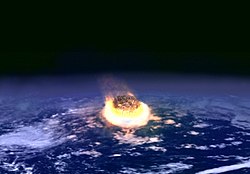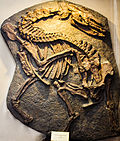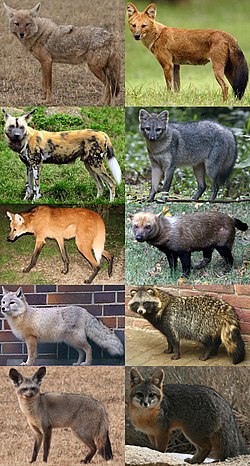Marine extinction intensity during Phanerozoic % Millions of years ago (H) K–Pg Tr–J P–Tr Cap Late D O–S The Eocene–Oligocene extinction event, also called...
41 KB (4,285 words) - 05:01, 28 July 2025
the Grande Coupure (the "Great Break" in continuity) or the Eocene–Oligocene extinction event, which may be related to the impact of one or more large bolides...
108 KB (11,797 words) - 10:38, 16 July 2025
This is a list of extinction events, both mass and minor: "Big Five" major extinction events (see graphic) Marine extinction intensity during Phanerozoic...
24 KB (1,941 words) - 12:30, 23 July 2025
end-Ordovician mass extinction or the Ordovician–Silurian extinction, is the first of the "big five" major mass extinction events in Earth's history,...
103 KB (11,116 words) - 03:20, 18 July 2025
Cretaceous–Paleogene (K–Pg) extinction event, formerly known as the Cretaceous-Tertiary (K–T) extinction event, was the mass extinction of three-quarters of...
200 KB (22,036 words) - 19:07, 24 July 2025
Marine extinction intensity during Phanerozoic % Millions of years ago (H) K–Pg Tr–J P–Tr Cap Late D O–S The Permian–Triassic extinction event, colloquially...
389 KB (41,157 words) - 03:04, 29 July 2025
Balkanatolia (category Eocene)
Western Europe for as much as 10 million years before the Eocene–Oligocene extinction event, the Grande Coupure when Antarctic glaciation began, sea levels...
5 KB (526 words) - 23:04, 23 November 2024
Late Devonian mass extinction, also known as the Kellwasser event, was a mass extinction event which occurred around 372 million years ago, at the boundary...
80 KB (8,997 words) - 16:41, 22 May 2025
Eocene was marked by the Eocene–Oligocene extinction event, the European face of which is known as the Grande Coupure. The Oligocene Epoch spans from 33.9 million...
36 KB (3,808 words) - 07:17, 5 July 2025
extant forms of molluscs. The Oligocene is preceded by the Eocene Epoch and is followed by the Miocene Epoch. The Oligocene is the third and final epoch...
73 KB (8,113 words) - 13:27, 15 July 2025
at about 34 Mya (million years ago), in the mid-Cenozoic (Eocene–Oligocene extinction event), and the term Late Cenozoic Ice Age is used to include this...
49 KB (5,375 words) - 16:41, 19 June 2025
Popigai impact structure (category Eocene impact craters)
million years ago during the late Eocene epoch (Priabonian stage). It might be linked to the Eocene–Oligocene extinction event. The structure is 300 km (190 mi)...
11 KB (911 words) - 20:21, 24 April 2025
Marine extinction intensity during Phanerozoic % Millions of years ago (H) K–Pg Tr–J P–Tr Cap Late D O–S The Triassic–Jurassic (Tr-J) extinction event (TJME)...
176 KB (18,567 words) - 04:43, 30 July 2025
extinctions than other regions. The Late Pleistocene-early Holocene megafauna extinctions have often been seen as part of a single extinction event with...
202 KB (19,673 words) - 22:34, 28 July 2025
Strait's disappearance and the extinction of much of Europe's original fauna during the Eocene-Oligocene extinction event, Asian-originating lineages such...
4 KB (419 words) - 06:51, 5 January 2025
The Holocene extinction, also referred to as the Anthropocene extinction or the sixth mass extinction, is an ongoing extinction event caused exclusively...
270 KB (25,820 words) - 12:18, 24 July 2025
The Paleocene–Eocene thermal maximum (PETM), alternatively ”Eocene thermal maximum 1 (ETM1)“ and formerly known as the "Initial Eocene" or “Late Paleocene...
192 KB (21,262 words) - 23:14, 26 July 2025
Proailurus is the oldest known cat that occurred after the Eocene–Oligocene extinction event about 33.9 million years ago; fossil remains were excavated...
50 KB (3,956 words) - 01:21, 1 August 2025
Palaeotherium (category Oligocene genus extinctions)
lived in Europe and possibly the Middle East from the Middle Eocene to the Early Oligocene. It is the type genus of the Palaeotheriidae, a group exclusive...
115 KB (11,959 words) - 09:14, 24 June 2025
Thaumastosaurus (category Eocene amphibians)
from the Eocene of Algeria. Thaumastosaurus appears to have gone extinct at the end of the Eocene, during the Eocene–Oligocene extinction event as the climate...
6 KB (596 words) - 00:41, 27 May 2025
Human extinction or omnicide is the hypothetical end of the human species, either by population decline due to extraneous natural causes, such as an asteroid...
64 KB (7,168 words) - 11:42, 29 July 2025
during the Late Eocene or middle Oligocene. Uniquely, they appear to have diversified during the midst of the Eocene-Oligocene extinction event. Until the...
23 KB (2,291 words) - 22:02, 6 July 2025
Late Palaeocene or middle Eocene between 60 and 45.5 million years ago and escalated during the Eocene–Oligocene extinction event about 34 million years...
36 KB (10,415 words) - 18:27, 13 June 2025
Bachitherium (category Oligocene extinctions)
genus of Paleogene ruminants that lived in Europe from the late Eocene to the late Oligocene. The genus was erected in 1882 by Henri Filhol based on fossil...
109 KB (11,551 words) - 06:41, 8 July 2025
De-extinction (also known as resurrection biology, or species revivalism) is the process of generating an organism that either resembles or is an extinct...
109 KB (11,642 words) - 09:08, 18 July 2025
Canidae (category Extant Eocene first appearances)
specialized hypercarnivorous diets that made them prone to extinction.: Fig. 1 By the Oligocene, all three subfamilies (Hesperocyoninae, Borophaginae, and...
46 KB (5,073 words) - 18:03, 27 July 2025
Europe in the wake of a cooling/drying trend and the resulting Eocene-Oligocene extinction event, as part of an overall replacement of Europe's previously...
15 KB (1,425 words) - 05:45, 23 May 2025
Marine extinction intensity during Phanerozoic % Millions of years ago (H) K–Pg Tr–J P–Tr Cap Late D O–S An extinction event (also known as a mass extinction...
150 KB (15,140 words) - 01:52, 12 July 2025
transition between the Eocene and Oligocene epochs there was a significant extinction event, the cause of which is debated. The Oligocene Epoch spans from 34...
61 KB (6,169 words) - 15:03, 16 July 2025




















